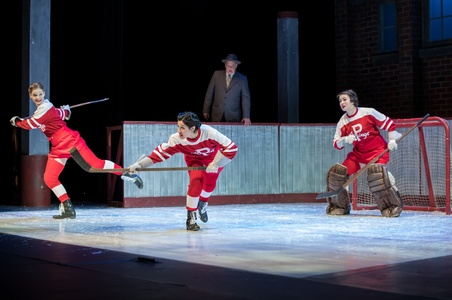Glory at the 1000 Islands Playhouse: Well-meaning hockey history production, but lacking in dramatic tension

Following in a similar thread to recent sports-based Canadian musicals such as The Hockey Sweater, Western Canada Theatre’s mounting of Glory by Tracey Power tells the story of the Preston Rivulettes, a record-setting women’s hockey team in the 1930s. Meant as a narrative of empowerment, the play also touches on issues of sexism, anti-Semitism and economic hardship during that period. While the thrill of the team’s exploits on ice is effectively captured in this production at the 1000 Islands Playhouse under both director James MacDonald and Power’s own choreography, the play never quite addresses the background issues which inform the team’s reality in a meaningful way. The economic and personal frustrations of the women are expressed during conversations between games but often take a backseat to the spectacle of the game itself.
The women’s passion for sports is certainly evident throughout, from the first scene depicting a lively game of baseball. Focusing on four real-life players from the Rivulettes (sisters Hilda and Nellie Ranscombe, and Marm and Helen Schmuck), the story begins with their idea of forming a hockey team for the winter season. In spite of the initial objections of local arena manager Herb Fach, Hilda (who becomes the team captain) is eventually able to persuade him to coach them for the upcoming ladies’ hockey season. From there follows a saga of hard-fought games to advance in the league and the off-ice challenges faced by the teammates along the way. The diminishing funds of the Ranscombe sisters’ family, the discriminatory barriers Marm faces as an aspiring Jewish law student, and Nellie’s unrequited feelings for Helen are only some of the real-life complications which threaten to interfere with the Rivulettes’s success.
The main theme of Glory, being empowered to fulfill one’s dreams regardless of their gender or ethnicity, is certainly a worthy sentiment in any age. The potential emotional heft from the theatrical expression of this sentiment, however, is reduced simply by the fact that not enough time is spent on the serious background of the play’s events. Mentions of Hitler’s rise to power across the Atlantic, as well as increasing domestic anti-Semitism (such as the 1933 Christie Pits riot), are made briefly and often serve to only advance the plot of the Rivulettes’s progress in the league. Given recent stands taken by athletes against racism, such as the kneeling of Colin Kaepernick and other NFL athletes during the American anthem, the power of sports to combat intolerance could have been more actively highlighted so as to give the play enhanced relevance in the present moment.
The strongest performances are given by Andrew Wheeler as Coach Fach and Advah Soudack as the spirited Marm Schmuck. The coach’s dry sense of humour, coupled with Wheeler’s matter-of-fact delivery, works a good counterweight to the unbridled optimism of the team. His character’s privileged status as a German-Canadian is also nicely subverted when he reveals to Marm his own experience of being branded as an enemy alien during the First World War; the confrontations which take place between them prior to this moment are arguably the most dramatic in the play. Soudack easily holds her own as Marm, capturing the character’s incredulousness and anger at being discriminated against due to her Jewish heritage convincingly.
The other actors are equally credible in their roles as the three remaining teammates; Katie Ryerson has the right amount of earnest enthusiasm as team captain Hilda, Morgan Yamada is duly energetic as goalie Nellie, and Kate Dion-Richard ably navigates Helen’s development from reluctant lady to unapologetic player on the ice. Both the women’s jerseys and ordinary clothes are suitably designed for the period by Cindy Wiebe, and the ice-covered stage is an equally authentic-looking feature of Narda McCarroll’s set.
Glory runs until August 17 at the Springer Theatre in the 1000 Islands Playhouse in Gananoque, ON. For information and tickets, see http://www.1000islandsplayhouse.com/glory/
Glory by Tracey Power
Cast:
Kate Dion-Richard: Helen Schmuck
Katie Ryerson: Hilda Ranscombe
Advah Soudack: Marm (Margaret) Schmuck
Andrew Wheeler: Herb Fach
Morgan Yamada: Nellie Ranscombe
Creative Team:
James MacDonald: Director
Tracey Power: Choreographer
Narda McCarroll: Set & Lighting Designer
Cindy Wiebe: Costume Designer
Steve Charles: Sound Designer